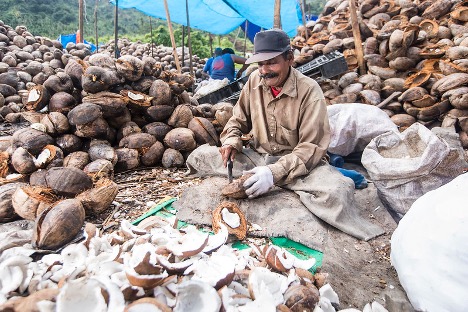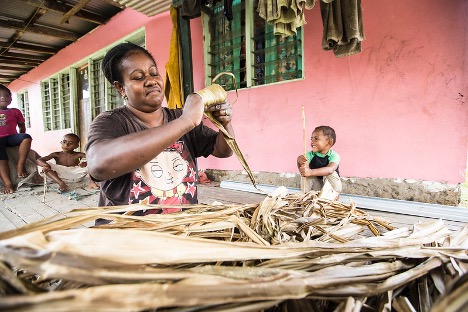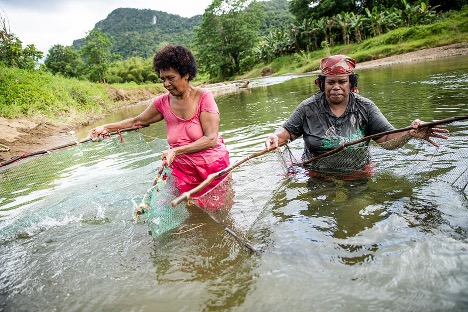 Climate Disaster Risk Financing Framework and Parametric Insurance
Building the resilience of vulnerable populations in Fiji against climate disasters through parametric microinsurance
Climate Disaster Risk Financing Framework and Parametric Insurance
Building the resilience of vulnerable populations in Fiji against climate disasters through parametric microinsurance

Challenges
Fiji is ranked the 14th most hazardous country in the world according to the World Risk Index (2021). The South Pacific nation is highly vulnerable to extreme weather events and has limited financial capacity to cope. In 2016, the economic disruption caused by Tropical Cyclone Winston wiped out one-fifth of Fiji’s GDP. Back-to-back cyclones in December 2020 and February 2021 destroyed hundreds of homes and agricultural assets.2 Low-income households suffer the most during these events and the situation is exacerbated by the lack of climate and disaster risk finance and insurance (CDRFI) instruments in Pacific markets. Access to parametric micro-insurance serves as a livelihood protection for farmers, fishers and small businesses, helping protect them from loss of income or business interruptions that might occur when a disaster strikes.
Towards a Solution
To address this persistent development challenge, the United Nations Capital Development Fund (UNCDF), in partnership with the Government of Fiji, launched the Developing Climate Disaster Risk Financing Framework and Parametric Insurance in Fiji project in September 2020. The project equipped governments and communities with tailored CDRFI solutions to build resilience and support recovery against extreme climate shocks.
Project implementation was led by UNCDF in close partnership with the Fijian Government, Reserve Bank of Fiji and other public and private sector stakeholders. The project addressed SDG1 (no poverty), SDG5 (gender equality), SDG13 (climate action) and SDG17 (partnerships for the goals).
The project introduced a market-based parametric micro-insurance product to the Fiji market in August 2021. The target beneficiaries included women, farmers, fishers, MSMEs, people with disabilities and other vulnerable groups. The project provided beneficiaries with immediate liquidity post catastrophic events, such as cyclones, so that they can recover faster and build back their livelihoods. During project implementation, insurance was distributed through cooperatives and associations with wide community reach and networks. However, insurance products will soon be offered directly – both online and through mobile apps – even to customers who do not belong to a cooperative. The project’s strong linkages with Fiji’s private insurers, and the government’s backing, was highly useful to achieve this latter goal.
The project used a host of digital solutions to increase access and effectiveness. For instance, a digital client relations management platform, iOnboard, connected members to their cooperatives. Similarly, mobile money wallets allowed clients to make digital payments. Both these solutions will be further expanded for the next phases.
The project worked with MicroSave Consulting, which has its head office in India, to assist implementing partners with their marketing, awareness and outreach plan and activities. This collaboration helped improve the financial capabilities of individuals and enabled informed decision making on climate disaster risk instruments.
The programme worked with research partners at the University of the South Pacific, the University of the West Indies and the United Nations University Institute for Environment and Human Security to create a research cooperation arrangement focusing on vulnerability and CDRFI solutions for small-island developing states. This cooperation produced high quality, peer-reviewed research and action-oriented and evidence-based policy briefs and reports, contributing to the development of the next iteration of the product during a potential scale phase. These research reports will be published in 2022.
Within the first six months, over 1,300 households signed up for the insurance (of which 32 percent were women). In 2021, the Fijian Government granted a VAT-exemption (9 percent originally, now 15 percent) on premiums for the product before it was officially deployed to the competitive market. Such a landmark policy announcement will provide financial relief to low-income households and micro-enterprises, further improving accessibility and uptake.
To further strengthen South-South cooperation, the project promoted partnerships with India through linkages with insurance companies, FinTechs, InsurTechs and other technology service providers. While Fiji has a relatively strong insurance industry, climate disaster risk insurance is a new concept. The Indian insurance industry on the other hand has well developed parametric insurance solutions, especially for crops and livestock farmers. The public and private sector in Fiji benefit from partnering with insurance stakeholders in India to build their own capacities and gain a better understanding of how to maximize the impact of such interventions. An example is the project enlisting the services of M/S Weather Risk Management Services which modelled the first parametric insurance product in Fiji and is providing capacity building training to various partners in Fiji.
Due to the initial achievements of the project and using the learnings from Fiji, UNCDF is now planning to replicate the insurance deployments in Tonga and Vanuatu, two other vulnerable small island developing states.
Contact Information
Countries involved
Supported by
Implementing Entities
Project Status
Project Period
URL of the practice
Primary SDG
Primary SDG Targets
Secondary SDGs
Secondary SDG Targets
Similar Solutions
| NAME OF SOLUTION | Countries | SDG | Project Status | |
|---|---|---|---|---|
A Billion Brains: Smarter Children, Healthier Economies High Level Meeting on South-South Cooperation for Child Rights |
Fiji, India | 17 - Partnerships for the Goals | Completed | View Details |
Accelerating Digital Transformation in All Ministries in Bangladesh Promoting the rapid design and implementation of plans to digitize all ministries and subordinate government institutions in Bangladesh |
Fiji, India | 10 - Reduced Inequalities | Ongoing | View Details |
Accelerating the Implementation of African Union Treaties in São Tomé and Príncipe South-South learning from the Beninese judicial system’s experience in the application of human rights treaties to its national law |
Fiji, India | 05 - Gender Equality | Completed | View Details |
Accelerating the Transformational Shift to a Low-Carbon Economy in Mauritius Towards supplying 35 percent of the country’s energy needs with renewables by 2025 |
Fiji, India | 05 - Gender Equality 09 - Industry, Innovation and Infrastructure 13 - Climate Action | Ongoing | View Details |
Access to Justice through e-Services and Dematerialized Case Management Scaling up connectivity and unlocking the digital potential of judicial institutions to enhance access to justice for all |
Fiji, India | 05 - Gender Equality | Completed | View Details |





